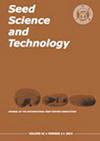Gelatin capsules as a delivery system for tomato (Lycopersicon esculentum) seed enhancements
IF 3
4区 农林科学
Q2 AGRONOMY
引用次数: 1
Abstract
Seed enhancements involve post-harvest modifications of seeds intended to improve germination and plant performance. This includes seed modifications that facilitates the delivery of other plant-benefiting components (e.g., nutrients or plant protectants). This study examined the use of tomato-seed encapsulation as a possible extension of seed coatings. Placing seeds within gelatin capsules offers potential benefits including space for greater volumes of additives, separation between protectant chemicals and seeds, minimised human exposure to agrochemicals, and improved uniformity for mechanical planters. The objectives of this study were to determine if seed encapsulation alters seedling emergence, plant performance and serves as a delivery-system for controlled-release fertilizers. The results demonstrate that seed encapsulation delayed initial plant emergence by one day, and between one and two days for encapsulation with fertilizer treatments. Gelatin capsules alone in comparison with the control improved early root development, promoted plant growth and increased fruit production, indicative of gelatin’s biostimulant properties. The addition of controlled-release fertilizers (especially Florikan, 18:6:8) provided greater aboveground, belowground and total plant mass. The results of this study support the concept that seed encapsulation can improve tomato performance, and that other component(s) can be successfully delivered to provide additional plant benefits.明胶胶囊作为番茄种子增强的传递系统
种子增强包括收获后对种子进行改良,以提高种子萌发率和植物性能。这包括有利于输送其他植物有益成分(如营养物质或植物保护剂)的种子改造。本研究探讨了利用番茄种子包封作为种子包衣的可能延伸。将种子放在明胶胶囊中提供了潜在的好处,包括为更大体积的添加剂提供空间,将保护剂化学品和种子分开,最大限度地减少人类接触农用化学品,以及提高机械播种机的均匀性。本研究的目的是确定种子包封是否会改变幼苗出苗、植物性能,并作为控释肥料的输送系统。结果表明,种子包壳处理使植株初出苗延迟1天,化肥包壳处理延迟1 ~ 2天。与对照相比,单独使用明胶胶囊改善了早期根系发育,促进了植物生长,增加了果实产量,表明明胶的生物刺激素特性。添加控释肥料(特别是佛罗里达肥料,18:6:8)可以增加地上、地下和植株的总质量。这项研究的结果支持种子包封可以提高番茄性能的概念,并且其他成分可以成功地提供额外的植物益处。
本文章由计算机程序翻译,如有差异,请以英文原文为准。
求助全文
约1分钟内获得全文
求助全文
来源期刊

Seed Science and Technology
农林科学-农艺学
CiteScore
3.00
自引率
28.60%
发文量
36
审稿时长
>36 weeks
期刊介绍:
Seed Science and Technology (SST) is an international journal featuring original papers and articles on seed quality and physiology related to seed production, harvest, processing, sampling, storage, genetic conservation, habitat regeneration, distribution and testing. A journal that meets the needs of researchers, advisers and all those involved in the improvement and technical control of seed quality. Published every April, August and December.
 求助内容:
求助内容: 应助结果提醒方式:
应助结果提醒方式:


